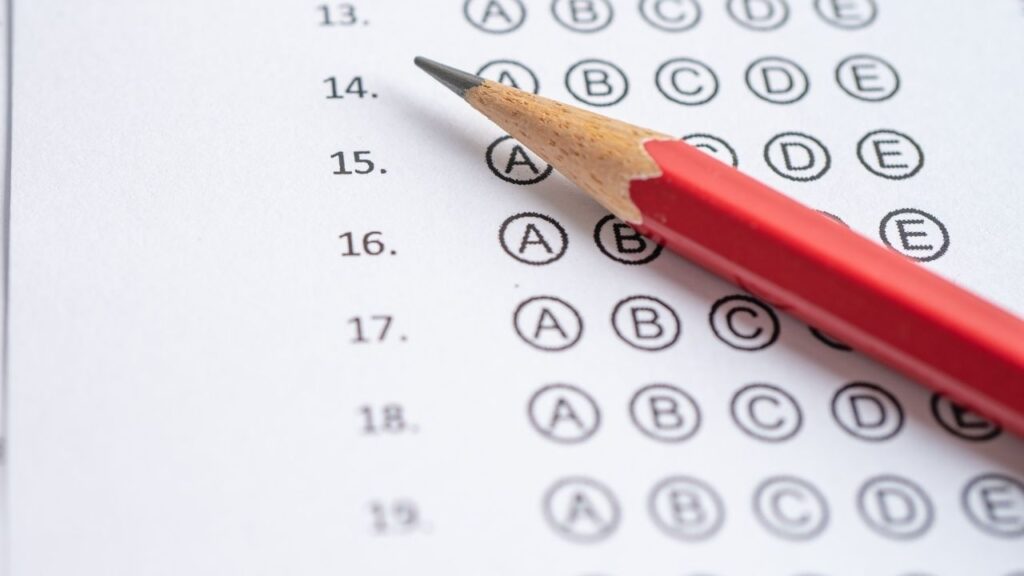Are you ready to take the test?
I took my CIPLE exam on Saturday and thought I would share my experience with you. If you, or somebody you know wants to Ace the Portuguese CIPLE Exam in the near future, this article could be useful.
When I arrived at the Universidade do Algarve, a few people had already gathered at the entrance and in the lobby. They hurried nervously to the noticeboard to check for their names. There were four groups and each group was allocated a room.
Stay in the lobby – don’t go to the room until you are called.
So far so good. On the notice board it said that the exam was to start at 9:30 am. A lady arrived and called out our names, around 9:40 am and we were led to the examining rooms.
In our group there were 18 of us. We were allocated our desks. The examiners seemed flustered and rushed through the rules a little. From the looks on people’s faces I think some may have not understood. However, don’t panic, as the rules are also written down on the exam sheets. You will get time to read them.
So don’t worry.
Our belongings were placed at one end of the room. Phones in bags and switched off. Our ID was to be placed on the desk in front of us – don’t forget to bring it!
You will also need to bring a pen, a pencil and an eraser. I brought a pencil sharpener, and a few spare pens and pencils – just in case.
We started at 10:10am
The sheets were given out for the first part. Make sure the number on the sheet corresponds with the number on your name tag on the table.
The exam is split into three parts.
The First Part – Reading Comprehension and Written Production and Interaction
The first part of the test is multiple choice. This part has a duration of 1h15m and makes up 45% of the total score.
You will receive a question sheet and an answer sheet. Read the questions carefully.
The answer sheet was not like the one in my CIPLE book, though, it was more like the one below. I think somebody remark that it is like the American test sheets.

When choosing the answers, the letter and the surrounding circle has to be completely covered with pencil. I was surprised that we got to use a pencil for this, but somewhat relieved, as it meant that if necessary, we could erase it and choose a different letter.
When we were only a few minutes into the test I spotted an error ; ‘estás’ instead of ‘está’. I called it to their attention and they made a note of it.
The questions were standard as per format in most textbooks and PDF file examples (See below).
Important note: At the end of the test we had to write 2 messages to a friend. The subject is given in each case. Be sure to stay within the required number of words. If they state between 55-80 words – do not go over or you will receive ‘zero’ for that assignment. This is to be written out in pen and you have a scrap piece of paper to write notes on before writing on the answer sheet.
When we were told we only had half an hour to go it was met with gasps. I had already finished and still had a chance to go over the test again (recommended). I spotted an error where I had written a phrase twice and that messed up my word count. You can strike through words, phrases, but you cannot use a corrector pen/ribbon.
The Second Part – Oral Comprehension
After a short 10 minute break we had to take the audio test in the same room. This test has a duration of 30 minutes and is 30% of the total score. Here we need to listen to various audio clips and answer questions on them. Again multiple choice. (See below for example).
Lunchtime
Lunchtime can be just an hour or so – or a tad more. Published on the board were more notices about the afternoon tests. It is a good idea to take a look straight away. They partner you up with a ‘chat buddy’ and it is good if you can mix with them during lunch time and practice a little. These tests are done in ‘pairs’, not groups. Yours could be early on in the afternoon or later. Luckily our test was at 3:30pm. So we didn’t need to wait too long.
The Third Part – Oral Production and Interaction
After lunch we made our way to the lobby where we had to sign a permission slip. This test is filmed, but don’t worry the camera is so tiny you won’t even notice it. We all had to wait in a classroom until we were called. When we were called we had to wait in pairs outside the examiner’s room.
We were asked to say a little about ourselves, then we were shown photos of different people and different professions, where we could converse with one another about the photo. After that we were shown photos individually and had to either make up a story or describe the scene.
It was a fun day out for me and I met some lovely people!
Below are 10 tips to help you Ace the Portuguese CIPLE Exam.

1. Exam Format
Familiarize yourself with the CIPLE exam format, including the number of sections, types of questions, and time constraints. This will help you know what to expect on the day of the exam.
2. Use Official Study Materials
Obtain official CIPLE study materials (see links and the end of this article), which often include sample exams, practice questions, and vocabulary lists. These resources are tailored to the exam’s content and structure. Note that these might be different from the text books. For example the answer sheets in my exam were not the same as the ones in my textbook.
3. Build Your Vocabulary
Focus on expanding your Portuguese vocabulary. Try to learn vocabulary related to daily life, work, travel, and hobbies. Learn adjectives and nouns with similar meanings a they don’t always use the more common ones.
4. Grammar
Review fundamental Portuguese grammar rules and sentence structures. Pay attention to verb conjugations, noun-adjective agreement, and word order and gender. Verbs are not as hard as they seem. See how to get your Free Verb List below!
5. Listening Skills
Improve your listening skills by watching Portuguese-language TV shows, movies, or listening to podcasts or music. Many people have told me that podcasts with simple content are not so easy to find, so I made this channel Uma Inglesa Algarvia.
6. Speaking Practice
Engage in regular speaking practice with native speakers, language exchange partners, or language tutors. Practicing conversation is crucial for oral proficiency. Another idea is to record yourself and compare it to the original recording.Try to speed up your speech too.
7. Reading Comprehension
Read Portuguese texts, such as news articles, books, and online content. Start with simple texts and gradually work your way up.
8. Writing Skills
Practice writing short stories, emails, or journal entries in Portuguese. Focus on correct grammar and vocabulary usage. Ask for feedback to improve your writing.
9. Time Management
Simulate exam conditions by taking timed practice tests. This will help you manage your time effectively during the actual exam and reduce test anxiety. It is good to have a little ‘extra time’ at the end to be able to check your answers.
10. Cultural Awareness
In this exam we were shown a photograph of different people and different professions, but you may be asked about Portuguese culture, customs, and traditions. Understanding the cultural context can be beneficial for comprehension and conversation during the exam.
There you have it. Remember that consistency is key when preparing for any language exam. Setting specific goals and creating a study schedule that fits your needs and commitments.
Don’t forget to sign up for the newsletter below and claim your free verb list!
Looking for structured lessons and guidance? Visit Speak European Portuguese.
Or contact me: portugueseinsixweeks@gmail.com
Official Study Materials
Below are some of the official study materials and the link that will show you how to enroll.
PDF: Reading competency: https://caple.letras.ulisboa.pt/files/exemplos/CIPLE_CL_PIE.pdf
PDF: Oral Competency: https://caple.letras.ulisboa.pt/files/exemplos/CIPLE_CO.pdf
Sign up for exam: https://caple.letras.ulisboa.pt/exame/2/ciple

12 responses to “How to Ace The Portuguese CIPLE Exam”
Thanks for sharing this with Portugal Living Magazine and its audience!
You are welcome! Thank you for publishing it 🙂
Thanks for this! How many multiple choice questions were there for the reading part?
Hi Rae, glad you liked it. Please share. I can’t recall too well now, but I would say about 3 or 4. I think these details might not always be the same.
Hello. Thank you for this great summary. I had a question about the written part. You mentioned if you go over the word count that you get a zero for this part, did the administrator of the exam state this because I can’t find it in the instructions! Im always over when practicing!
Hi. It was odd, because they stated this but the lady that was with me went over and didn’t get zero for that part of the exame. TO be on the safe side I wouldn’t go over the limit. Definitely not under either. Thanks for reading.
Thanks for the helpful info. I’m wondering with the Listening component, do you get time to read the question before the audio track is played, or does the examiner set the pace and just play each audio to their own pace?
Hi!
You have time to read the questions. The secret is to not panic. I hate doing tests, but I did very well with this one. What level of Portuguese are you currently?
I did the exam on June 22 and was taken aback by the final part of the listening comprehension. Instead of having those easy responses (eg ‘aeroporto’ when passengers are told to go to their gate) this one had a list of replies to a recorded statement – eg statement says ‘take this medicine’ and you have to find the response – ‘will it make me better?’. Or ‘how was your meal?’ and you have to find ‘it was very tasty’. Some were quite tricky.
Hi Alison!
The tests will not always be exactly the same unfortunately. How do you think you did overall?
Thank you very much for sharing this information. For the listening section, is it on a speaker for the room or does each person have headphones?
I took the test at the Universidade do Algarve and there was a speaker. The quality wasn’t great. They do repeat the phrases so you get a chance to hear them more than once.